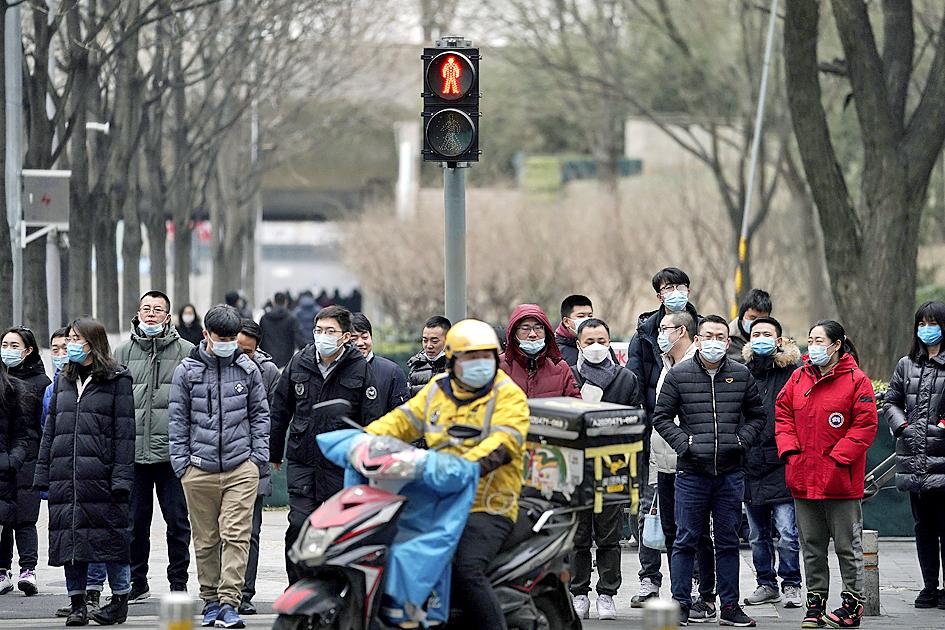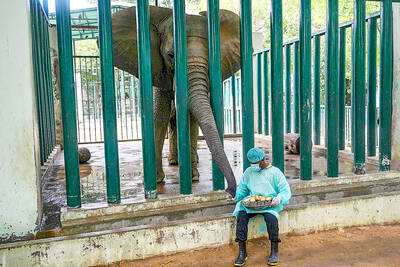On the Chinese microblogging platform Sina Weibo, enthusiastic slackers share their tips: Fill up a thermos with whiskey, do planks or stretches in the work pantry at regular intervals, drink liters of water to prompt lots of trips to the toilet on work time, and, once there, spend time on social media or playing games on your phone.
“Not working hard is everyone’s basic right,” one commenter wrote. “With or without legal protection, everyone has the right to not work hard.”
Young Chinese people are pushing back against an engrained culture of overwork, and embracing a philosophy of laziness known as “touching fish.”

Photo: AP
The term is a play on a Chinese proverb: “Muddy waters make it easy to catch fish,” and the idea is to take advantage of the COVID-19 crisis drawing management’s focus away from supervising their employees.
The author of a viral post at the center of the conversation, Sina Weibo user Massage Bear, described “touching fish” as a life attitude.
It “is a life philosophy of perfunctory living, letting go of oneself and others at the same time ... and that’s the key to living in the moment and being relaxed,” she said.
Some make a game of it, aiming to be the employee who uses the most toilet paper, or getting up from their desk whenever any other colleague does, online news site Quartz reported.
The deliberate slowdown at work marks a cultural shift among younger generations, who are pushing back against unhealthy work hours for little gain, and not seeing the opportunities for upward mobility experienced by their parents.
“The fundamental reason for me to do that is that I no longer believe that I can get a promotion in my current company by hard work and ability,” one user said.
“There’s a joke in the tech industry, if you work hard before 35 as an engineer in a food delivery company, then after 35 you are the delivery guy,” said Yan Suji (閻?), a 25-year-old chief executive of tech start-up mask.io.
“I’ve heard of people being fired after 35 because they spent less time in the company, because they have families to look after and they have less energy than the younger people,” Yan said.
The “touching fish” movement has a sense of humor, but behind it is a deadly serious issue.
Recent deaths have again highlighted the dangers in China’s “996” work culture — a reference to working 9am to 9pm, six days per week at a minimum, particularly in the tech industry and among food delivery drivers.
The 996 attitude is widespread, despite labor laws saying work should be limited to eight hours per day, for an average of 44 hours per week.
Media reports include anecdotes of employees being offered bonuses or foldout beds for under the desk if they work overtime, fines for missing phone calls and even signal blockers in restrooms to stop employees using their cellphones while on the toilet.
“It’s not that I don’t do my job well,” wrote one user online.
“Touching fish to resist 996 is nothing more than a kind of nonviolent noncooperation in a harsh working environment and a difficult process of safeguarding rights,” they said.
Last month, a 23-year-old employee of e-commerce giant Pinduoduo died after working past midnight, the company confirmed earlier this month.
While her death has not been formally attributed to overwork, the company attracted a furious backlash over the expectations put upon employees, and it was exacerbated further when earlier this month an engineer — surnamed Tan — took his own life.
Shortly afterwards Pinduoduo fired an employee, who uses the screen name Wang Taixu (王太虛) on Sina Weibo.
Wang said he was fired after posting a photograph online of an ambulance parked outside the company’s Shanghai office building with the caption “another brave Pinduoduo warrior has fallen.”
Pinduoduo reportedly disputed his characterization of the medical incident and said Wang was fired for “extreme comments made with obvious malice,” in breach of company rules, and unrelated to the ambulance video.
Another video he posted after he was fired, criticizing the intense work culture at the company, was viewed nearly half a million times, the online magazine Sixth Tone reported.
Pinduoduo denied the accusations in the video.
Yan said that companies skirted labor laws in globally familiar ways: hiring people as contractors rather than employees, and incentivizing people like delivery drivers to work long hours more often, with bonuses and games, rather than forcing them to do it.
He said that as a chief executive he understood the pressures companies were under to increase output, but disagreed with the systematic culture of overwork, and saw the touching fish movement as a form of safe resistance.
“People do that because they have no way of talking to the management,” he said.
Leading business people are still fans of 996. Alibaba founder Jack Ma (馬雲) has said the practice is key to being successful in competitive industries.
Xibei Canyin CEO Jia Guolong (賈國龍) said that people should be working “715” — 15 hours per day, seven days per week.
In 2019, a Huawei Technologies executive said that employees were asked to work past 10pm.
The practice has drawn opposition from state media, including Xinhua news agency and the state-run People’s Daily.
Yan said that the tech industry was having a reckoning with how it was enabling the 996 culture, for example by building the technology which exploits delivery drivers.
Github, a software development hosting site, has a project called 996.ICU (work 996 and you will end up in the intensive care unit), which documents companies enforcing excessive overtime.
“There are more and more engineers who are like the Github starters and want to contribute something to society, not to create algorithms to kill more delivery guys,” he said.
“There’s progress. I think my generation, when they become employers and CEOs, they’ll have more humane ways of management, they’ll try to fix the system,” he added.

NO EXCUSES: Marcos said his administration was acting on voters’ demands, but an academic said the move was emotionally motivated after a poor midterm showing Philippine President Ferdinand Marcos Jr yesterday sought the resignation of all his Cabinet secretaries, in a move seen as an attempt to reset the political agenda and assert his authority over the second half of his single six-year term. The order came after the president’s allies failed to win a majority of Senate seats contested in the 12 polls on Monday last week, leaving Marcos facing a divided political and legislative landscape that could thwart his attempts to have an ally succeed him in 2028. “He’s talking to the people, trying to salvage whatever political capital he has left. I think it’s

Polish presidential candidates offered different visions of Poland and its relations with Ukraine in a televised debate ahead of next week’s run-off, which remains on a knife-edge. During a head-to-head debate lasting two hours, centrist Warsaw Mayor Rafal Trzaskowski, from Polish Prime Minister Donald Tusk’s governing pro-European coalition, faced the Eurosceptic historian Karol Nawrocki, backed by the right-wing populist Law and Justice party (PiS). The two candidates, who qualified for the second round after coming in the top two places in the first vote on Sunday last week, clashed over Poland’s relations with Ukraine, EU policy and the track records of their

UNSCHEDULED VISIT: ‘It’s a very bulky new neighbor, but it will soon go away,’ said Johan Helberg of the 135m container ship that run aground near his house A man in Norway awoke early on Thursday to discover a huge container ship had run aground a stone’s throw from his fjord-side house — and he had slept through the commotion. For an as-yet unknown reason, the 135m NCL Salten sailed up onto shore just meters from Johan Helberg’s house in a fjord near Trondheim in central Norway. Helberg only discovered the unexpected visitor when a panicked neighbor who had rung his doorbell repeatedly to no avail gave up and called him on the phone. “The doorbell rang at a time of day when I don’t like to open,” Helberg told television

A team of doctors and vets in Pakistan has developed a novel treatment for a pair of elephants with tuberculosis (TB) that involves feeding them at least 400 pills a day. The jumbo effort at the Karachi Safari Park involves administering the tablets — the same as those used to treat TB in humans — hidden inside food ranging from apples and bananas, to Pakistani sweets. The amount of medication is adjusted to account for the weight of the 4,000kg elephants. However, it has taken Madhubala and Malika several weeks to settle into the treatment after spitting out the first few doses they